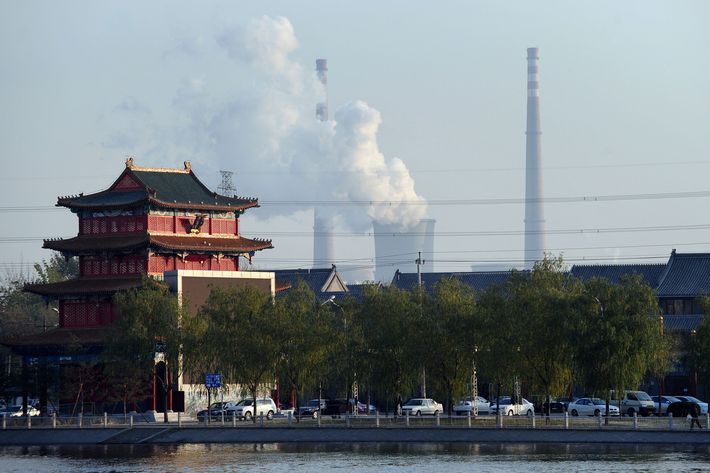
The Wall Street Journal editorial page today has a predictably scathing take on President Obama’s climate-change plan. In a brief aside to the main argument — regulation baaaaad — it dismisses Obama’s naïve belief that reducing U.S. carbon emissions might “inspire China” to “do the same.” With its trademark confident flippancy, the editorial snarks, “Good luck persuading Xi Jinping.”
At about the same time the Journal sneered at the prospect that China would ever reduce its carbon dioxide emissions, China announced it would limit its carbon dioxide emissions. (“The target will be written into China’s next five-year plan, which comes into force in 2016, He Jiankun, chairman of China’s Advisory Committee on Climate Change, told a conference in Beijing,” reports Reuters, “The government will use two ways to control CO2 emissions in the next five-year plan, by intensity and an absolute cap.”) In the face of contrary evidence, the Journal editorial page will surely reassess its certainty, right? Good luck persuading Paul Gigot.

When the Obama administration launched its health-care reform project five years ago, conservatives were held back by the sheer lack of interest in the issue they had accumulated over the decades. Conservative intellectuals had paid hardly any detailed attention to the specific problems of health-care economics and found themselves grasping for generalized right-wing bromides. (They have played vigorous catch-up in the years since.)
The same rough dynamic can be seen now as Obama launches a major climate change initiative. Conservatives are grasping for ideological truisms to fill a void of any detailed policy-level engagement. A case in point is the conservative belief that carbon reduction is pointless because China will never go along.
National Review’s editorial denouncing the Environmental Protection Agency’s new power-plant regulations offers a perfect sample of state-of-the-art conservative-movement thought on the subject. After the requisite nods to skepticism of climate science and Obama’s violation of the Constitution, the editorial patiently explains that reducing U.S. carbon emissions is stupid because the world will simply take up the slack:
If we reduce demand for coal in the United States by substituting other fuels in our electricity plants, that does not transform a corresponding sum of the world’s coal deposits into fairy dust. It will still be coal, and it will still be useful for producing electricity elsewhere. Reducing the amount of coal consumed by relatively clean-burning U.S. plants is much more likely to increase the amount of coal consumed by relatively dirty plants in Asia and Africa than it is to reduce coal consumption across the board. Coal is a mobile commodity; reducing demand for it here will only make it less expensive abroad.

This is the whole of National Review’s editorial treatment of the argument. It’s a simple aphorism: Other countries will do nothing whatsoever to limit their carbon emissions, so there is no point in us limiting ours. The same assumption undergirds most of the right-wing analysis I have found on this subject (such as the U.S. Chamber of Commerce’s “study” of power-plant limits, which has filled the void of conservative empirics.)
The striking thing about this reasoning is not so much that the conclusion is certainly wrong, but that it does not even recognize the counters of the debate. It’s true that the U.S. accounts for only around 15 percent of global carbon emissions, and Obama’s proposed reductions would have a modest impact on rising temperatures. But nobody thinks limiting U.S. greenhouse-gas emissions will solve climate change in and of itself. The entire purpose of doing so is to enable an international treaty.
The Journal’s editorial today at least acknowledges that Obama’s plan has a second part involving an international agreement. NR’s editorial, like a huge amount of right-wing commentary, simply assumes that the second part of the plan does not exist. It is like watching a man confidently explain why a mousetrap could never work on the assumption that the trap will be laid with no bait. Indeed, having dispatched Obama’s entire climate strategy with a wave of the hand, NR then goes on to posit that Obama’s plan is not even intended to address climate change at all: “Given the facts, we must consider the possibility that this is not about global warming at all but is instead simply another tax, and a relatively large one, that will be used to underwrite favors for Democratic interest groups …”

Now, it is true that negotiating international climate treaties is really hard. One cannot assume success is certain (nor are any advocates of Obama’s planning on doing so). But there is a fair amount of evidence to bolster Obama’s premise that committing the U.S. to the limits negotiated in Copenhagen in 2009 could at least plausibly bring other countries, especially China, along. Pilita Clark of the Financial Times has a report about “widespread interest in the [power-plant regulation] move outside the US,” including among Chinese officials. New York Times reporter Coral Davenport likewise describes widespread international attention to the plan. Analysts likewise portray China’s announcement today as a direct response to Obama’s plan:
The timing of the announcement – just a day after the Obama administration implemented tough new rules to cut carbon emissions from power plants 30% by 2030 – appears deliberately chosen to show China will also take a leadership role on climate change.
Why, it’s almost as if American action could somehow encourage other countries to follow along. I know far too little about internal politics in China or any other foreign state to make any confident prediction on the final outcome of the next climate talks. But the people who are paying attention to international thinking about climate negotiations seem to believe that American leadership stands at least a plausible chance of working. Meanwhile, American conservatives, who dismiss the prospect out of hand, are paying no attention at all. Their certainty is matched only by their lack of interest in the details.
Update: Andrew Revkin depicts the Chinese announcement as more of a trial balloon than a certain policy shift. I don’t think this changes anything important about the argument above – dismissing out of hand the possibility that China will cooperate on carbon reductions is silly, and ignoring that this is central to Obama’s strategy is even sillier. Still, readers should not come away from the item considering a hard cap on Chinese carbon to be some kind of fait accompli. As I wrote above, I know far too little about internal politics in China or any other foreign state to make any confident prediction on the final outcome of the next climate talks.






























